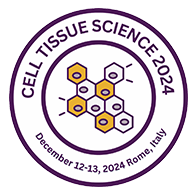Tissue Repair and Regeneration
Deregulation of traditional tissue repair has dramatic consequences for keeps quality and survival of patients. Together, skimpy healing (chronic wounds) and excessive repair when injury (scarring/fibrosis) cause tending prices reaching tens of billions of greenbacks annually within the USA alone. Chronic and fibrotic healing happens once the body’s own repair capability is either impaired or overpowered. One approach in regenerative drugs is to switch lacerate, unhealthy or aged tissues with practical tissue equivalents. This approach is challenged by adverse host reactions that area unit a part of the body repair program, e.g., immune, inflammatory, and fibrotic responses. Thus, regenerative drugs progressively consider to support the adult's bodies own regenerative capacities to push closure of wounds that ne'er heal and to stay excessive repair treed. However, it's still unclear why humans lost regenerative capability throughout evolution, whereas lower organisms will regenerate whole organs.
Related Conference of Tissue Repair and Regeneration
Tissue Repair and Regeneration Conference Speakers
Recommended Sessions
- 3D Bioprinting in tissue engineering
- Applications of Tissue Engineering
- Artificial Organs
- Bio Banking
- Bio fabrication & 3 D-Bio printing in Life Sciences
- Biochips and Tissue Chips
- Biomaterials Engineering
- Biomedical Engineering Techniques
- Bone and Cartilage Tissue Engineering
- Bone Tissue Engineering
- Cell and Organ Regeneration
- Cell Science
- Cell Therapy
- Cellular and gene Therapies
- Dendritic cells
- Gene and Immunotherapy
- Mast cells
- Materials and Designs for Tissue Engineering
- Soft Tissue Replacement
- Tissue Culture & Preservation
- Tissue Repair and Regeneration
- Tissue Science
Related Journals
Are you interested in
- 3D Structure Determination - Structural Biology-2026 (France)
- Advanced Drug Delivery Systems for Metabolic Therapy - DRUG CHEMISTRY CONF 2026 (France)
- Advanced Techniques in Structural Biology - Structural Biology-2026 (France)
- AI & Computational Structural Biology - Structural Biology-2026 (France)
- Biochemistry and Biophysics - Structural Biology-2026 (France)
- Biomarker-Guided Drug Development - DRUG CHEMISTRY CONF 2026 (France)
- Chemical Biology Tools in Metabolic Research - DRUG CHEMISTRY CONF 2026 (France)
- Computational Approach in Structural Biology - Structural Biology-2026 (France)
- Computational Drug Design and Molecular Modeling - DRUG CHEMISTRY CONF 2026 (France)
- Drug Designing and Biomarkers - Structural Biology-2026 (France)
- Drug Resistance and Therapeutic Durability - DRUG CHEMISTRY CONF 2026 (France)
- Enzyme Modulation Approaches in Antidiabetic Drug Design - DRUG CHEMISTRY CONF 2026 (France)
- Epigenetic Regulation and Small-Molecule Therapeutics - DRUG CHEMISTRY CONF 2026 (France)
- Future Directions in Drug Chemistry for Diabetes Management - DRUG CHEMISTRY CONF 2026 (France)
- Hybrid Approaches for Structure Prediction - Structural Biology-2026 (France)
- Lipid Chemistry and Metabolic Regulation - DRUG CHEMISTRY CONF 2026 (France)
- Medicinal Chemistry Strategies for Metabolic Disorders - DRUG CHEMISTRY CONF 2026 (France)
- Membrane Proteins and Receptors - Structural Biology-2026 (France)
- Molecular Modelling and Dynamics - Structural Biology-2026 (France)
- Natural Product Chemistry in Diabetes Drug Discovery - DRUG CHEMISTRY CONF 2026 (France)
- Oxidative Stress Modulation through Drug Chemistry - DRUG CHEMISTRY CONF 2026 (France)
- Peptide and Protein-Based Drug Chemistry - DRUG CHEMISTRY CONF 2026 (France)
- Pharmacokinetics and Drug Metabolism Studies - DRUG CHEMISTRY CONF 2026 (France)
- Prodrug Design and Chemical Activation Strategies - DRUG CHEMISTRY CONF 2026 (France)
- Proteomics and Genomics - Structural Biology-2026 (France)
- Regulatory Chemistry and Drug Safety Assessment - DRUG CHEMISTRY CONF 2026 (France)
- Structural Bioinformatics and Computational Biology - Structural Biology-2026 (France)
- Structural Biology in Cancer Research - Structural Biology-2026 (France)
- Structural Virology - Structural Biology-2026 (France)
- Structural Virology and Infectious Diseases - Structural Biology-2026 (France)
- Structure-Based Drug Discovery - Structural Biology-2026 (France)
- Structure-Based Solutions to Global Health Challenges - Structural Biology-2026 (France)
- Structure-Function Relationships - Structural Biology-2026 (France)
- Structure–Activity Relationship Studies in Drug Chemistry - DRUG CHEMISTRY CONF 2026 (France)
- Synthetic Chemistry Innovations in Drug Development - DRUG CHEMISTRY CONF 2026 (France)
- Targeting Pancreatic Function through Drug Chemistry - DRUG CHEMISTRY CONF 2026 (France)
- The Structural Basis of Disease - Structural Biology-2026 (France)
- Translational Drug Chemistry from Bench to Clinic - DRUG CHEMISTRY CONF 2026 (France)

